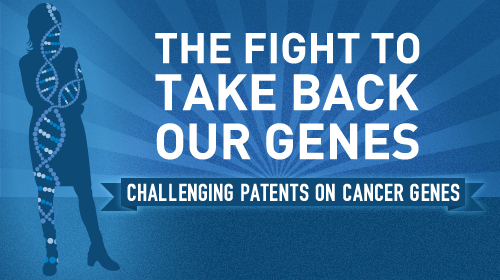
Today, we're headed to the U.S. Supreme Court for oral argument in our challenge to human gene patents.
The Court will decide this central question: are our genes – the basic elements of human biology and the blueprint for our cells, organs, and bodies – patentable? Or does patenting genes extend private property rights over products and laws of nature, in violation of the law?
According to Myriad Genetics, which controls the patents on two genes related
to hereditary breast and ovarian cancer, the genes become its "invention" once they are "isolated," or removed from the cell. It does not matter whether the genes come from you, me, or any of the other millions of Americans. The implications of the argument are breathtaking – what would prevent patents on a kidney removed from the body, or a leaf snapped from a tree? Myriad's attorney went so far as to say that elements of the periodic table, such as lithium, could also be patented once isolated. Myriad's lead scientist said patenting the genes was just like patenting the iPod.
We couldn't disagree more. Through its patents, Myriad has the right to stop anyone from using these genes for clinical or research purposes. It has therefore locked up a building block of human life.
The patents on BRCA1 and BRCA2 are harmful to patients and create barriers to medical and scientific advancement. Myriad has a monopoly on BRCA genetic testing in the U.S. and therefore controls the type and price of testing. Thus, while genetic testing technologies have advanced to the point where all 23,000 human genes can be sequenced for $1000, Myriad has raised its price for BRCA genetic testing to over $4000 in the last few years and still does not capture all known BRCA mutations. Other laboratories cannot provide second opinions, and they cannot include the BRCA genes when offering testing of the multiple genes that are now associated with breast and ovarian cancer risk. Gene patents also have a chilling effect on research. Researchers must either obtain permission from the patentholder, or run the risk of being sued. And by virtue of its patents, Myriad controls most of the data about the BRCA genes and has refused to share that information with the scientific community.
The Supreme Court has said for over 150 years that patenting products and laws of nature is prohibited, precisely because such patents inhibit, rather than incentivize, further progress and innovation. When scientists identify something in nature, like an element or a gene, they deserve praise. But what they find belongs to the storehouse of knowledge, for all to use as the basis for true inventions, such as lithium batteries, genetic tests, or drugs. We should not be forced to rely on a single entity to develop all possible applications of that product of nature. And Myriad relied on millions of dollars of federal funding for its work, making the case for keeping the BRCA genes in the public sphere especially compelling.
As we enter the courtroom today, we are joined by diverse yet unified voices opposing these patents, as well as the patents on the other 20% of our genes. Here's a partial list: the American Medical Association and American Society of Human Genetics; prominent geneticists including James Watson, Eric Lander, and John Sulston; economist Joseph Stiglitz; patient and cancer advocacy groups such as Breast Cancer Action, Facing Our Risk of Cancer Empowered, and the Ovarian Cancer National Alliance; the Southern Baptist Convention; and even the U.S. government (which issued the patents in the first place). If you agree, please stand with us!
Learn more about gene patenting and other civil liberty issues: Sign up for breaking news alerts, follow us on Twitter, and like us on Facebook.


